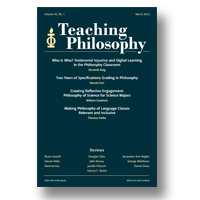|
articles |
|
1.
|
Teaching Philosophy:
Volume >
41 >
Issue: 4
Galen Barry
Using Conway’s Game of Life to Teach Free Will
abstract |
view |
rights & permissions
| cited by
The concept of determinism proves to be a persistent stumbling block to student comprehension of issues surrounding free will. Students tend to commit two main errors. First, they often confuse determinism with the related but importantly different idea of fatalism. Second, students often do not adequately understand that mental states, such as desires or beliefs, can function as deterministic causes. This paper outlines a straightforward in-class exercise modeled after John Horton Conway’s “Game of Life” computer simulation. The exercise aims to address the two main obstacles to understanding determinism and, as a result, improve student understanding of free will topics.
|
|
|
|
|
2.
|
Teaching Philosophy:
Volume >
41 >
Issue: 4
Brian Bruya, Monika Ardelt
Fostering Wisdom in the Classroom, Part 2:
A Curriculum
abstract |
view |
rights & permissions
| cited by
Advances in both the science and theory of wisdom have made it possible to create sound wisdom curricula and test them in the classroom. This article is a report of one such attempt. We developed a curriculum consistent with theories of wisdom that espouse the following five methods: challenge beliefs; prompt the articulation of values; encourage self-development; encourage self-reflection; and groom the moral emotions—facilitated by the reading of narrative or didactic texts and fostering a community of inquiry. The texts used in class were the Meditations of Marcus Aurelius, the Analects of Confucius, and the Dhammapada (along with some early Buddhist suttas). The requirements were reading the texts, writing reflection journals, active participation in class, and a personal philosophy of life summary. In this article, we explain each of these requirements, relate our particular methods to the more general methods, and speculate about how these methods may develop specific wisdom capacities.
|
|
|
|
|
3.
|
Teaching Philosophy:
Volume >
41 >
Issue: 4
Laura Martena
Thinking Inside the Box:
Concerns about Trolley Problems in the Ethics Classroom
abstract |
view |
rights & permissions
| cited by
This paper discusses the widespread use of "trolley problems" in the ethics classroom from a critical perspective. After tracing the enormous popularity of ‘trolleyology’ in recent moral philosophy, differentiating various functions these hypotheticals are supposed to fulfill in ethical discourse and carving out the underlying conception of normative ethics as a quasi-scientific enterprise, I examine how they are constructed and how they affect their recipient. Against this background, I argue that despite their popularity, the use of trolley problems in the ethics classroom turns out to be questionable for a number of reasons, most of which have already been advanced in the philosophical debate but hardly been reflected upon in the didactic context. Finally, I argue that the deconstruction of trolleyesque scenarios would be a good educational use of them. When it comes to using cases for didactic purposes, I suggest we give trolley problems a rest and develop more realistic scenarios.
|
|
|
|
|
4.
|
Teaching Philosophy:
Volume >
41 >
Issue: 4
Jake Wright
In Defense of the Progressive Stack:
A Strategy for Prioritizing Marginalized Voices during In-Class Discussion
abstract |
view |
rights & permissions
| cited by
Progressive stacking is a strategy for prioritizing in-class contributions that allows marginalized students to speak before non-marginalized students. I argue that this strategy is both pedagogically and ethically defensible. Pedagogically, it provides benefits to all students (e.g., expanded in-class discourse) while providing special benefits (e.g., increased self-efficacy) to marginalized students, helping to address historic educational inequalities. Ethically, I argue that neither marginalized nor non-marginalized students are wronged by such a policy. First, I present a strategy for self-disclosure that reduces the risk of inadvertent, unwanted disclosure while respecting marginalized student autonomy in a manner analogous to accommodations provided under the Americans with Disabilities Act. Second, I argue that non-marginalized students are not wronged because such students are not silenced during discussion and because non-marginalized students benefit from the prioritization of marginalized voices.
|
|
|
|
|
reviews |
|
5.
|
Teaching Philosophy:
Volume >
41 >
Issue: 4
Alexander Bearden
Consuming Choices: Ethics in a Global Consumer Age, 2nd Edition, by David T. Schwartz
view |
rights & permissions
| cited by
|
|
|
|
|
6.
|
Teaching Philosophy:
Volume >
41 >
Issue: 4
Dara Fogel
Twelve Rules for Life: An Antidote to Chaos, by Jordan B. Peterson
view |
rights & permissions
| cited by
|
|
|
|
|
|
|
7.
|
Teaching Philosophy:
Volume >
41 >
Issue: 4
Index to Volume 41 (2018)
view |
rights & permissions
| cited by
|
|
|
|
